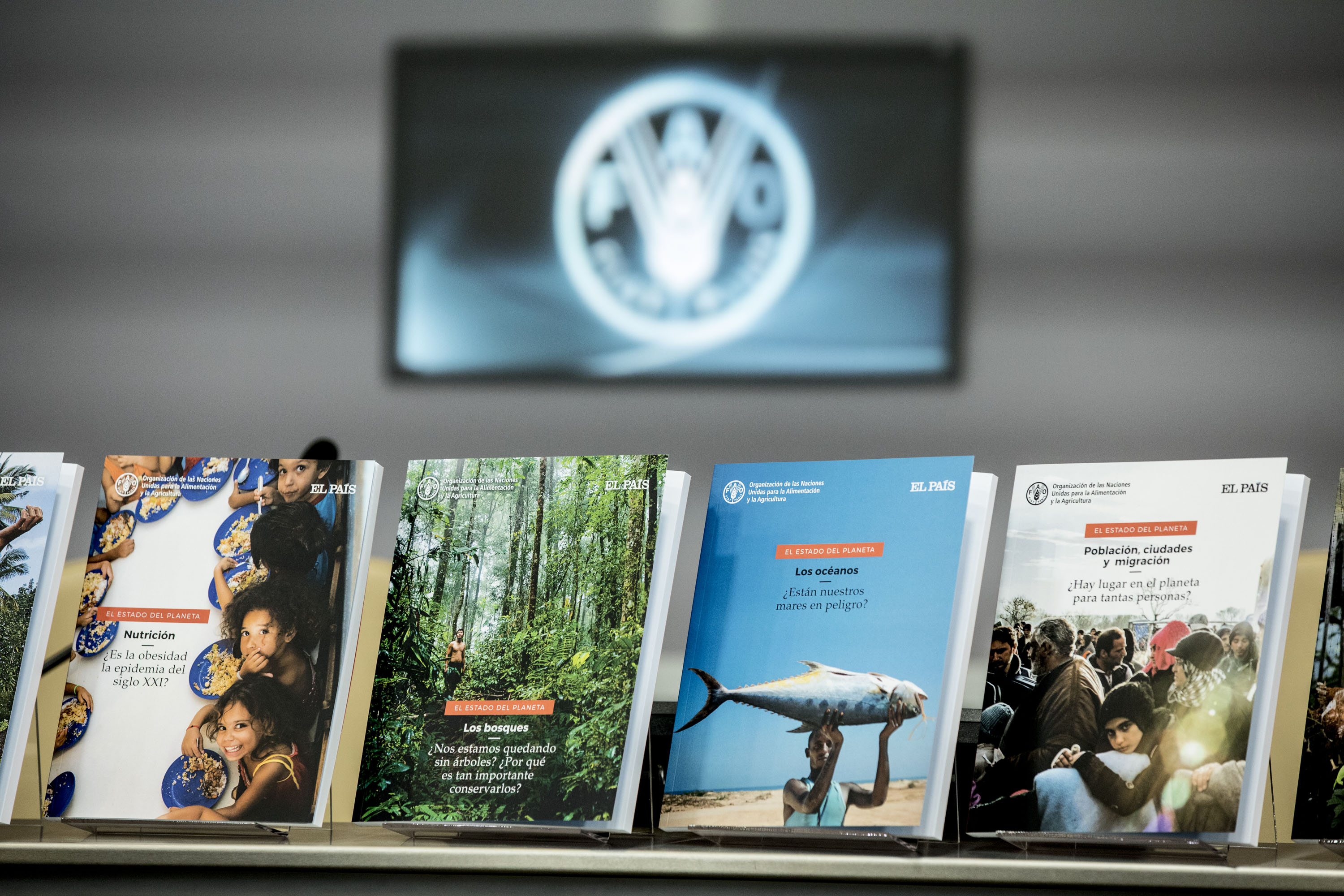[ad_1]

The State of the Planet book collection launched today.
The books will be distributed starting this Sunday in news stands around Spain. They address some of the more acute challenges that the international community must tackle, such as climate change, increasing hunger, nutrition problems, water scarcity and the state of the world’s forests and oceans.
“The media are indispensable allies in the fight against hunger and malnutrition. Our collaboration with EL PAÍS is a fantastic example of how we can work together to analyse and boost awareness of the big global objectives,” said Enrique Yeves, FAO’s Director of Communications who directed the collection along with FAO’s chief of Publications Pedro Javaloyes.
Juan Luis Cebrián, Chairman of EL PAÍS, Antonio Caño, the paper’s executive editor, and René Castro, FAO’s Assistant Director General and head of the Climate, Biodiversity, Land and Water Department, joined him in the presentation of the initiative at FAO’s headquarters today.
Richly illustrated with graphics and photographs, the books are based on the latest findings of key experts at FAO and other United Nations agencies in each of the thematic areas. They aim to make complex themes that affect everyone understandable to all.
“A newspaper concerned with the state of things can’t help but be concerned with the state of the planet,” said EL PAÍS editor Antonio Caño, pledging to redouble his publication’s offering on such issues. “The media is here to warn about problems and we’ll fail if we don’t manage to flag that the planet is deteriorating,” he added.
Each book will be distributed each Sunday for 1.95 euros as a supplement to EL PAÍS. The State of the Planet series titles include:
1. Los grandes desafíos (The big challenges) (22 April), will assess the state of our planet today and indicate a pathway to success for the 2030 Agenda.
2. El cambio climático (Climate Change) (29 April) explains what climate change is and how it will affect the planet, especially as regards agricultura.
3. Biodiversidad (Biodiversity) (6 May) discusses the importance of biodiversity conservation from the point of view of food security and nutrition, given that more tan 80 percent of the foods comprising human diets today come from crops, and just five main cereal crops provide 60 percent of all calories.
4. El agua (Water) (13 May) investigates how, given demographic pressures, urbanization and inefficient water managmenent, we can make sure there is enough water “for everybody and everything”.
5. La nutrición (Nutrition) (20 May) underscores the epidemic levels of overweigth and obesity that are afflicting many countries in the world.
6. Los bosques (Forests) (27 May) highlights the enormous and multifaceted importance of forests and their conservation.
7. Los océanos (Oceans) (3 June) reviews problems such as maritime pollution and illegal, unreported and unregulated fishing.
8. Población, ciudades y migración (Population, cities and migration) (10 June) explains global demographic trends and sketches out issues and possible solutions for the worst migration crisis the world has seen since the Second World War.
9. Hambre cero (Zero Hunger) (17 June) asks if we are truly conscious of the real scale of world hunger today, when 815 million people face chronic hunger, with the recent increase due mostly to conflicts and climate change.
10. La nueva revolución agrícola (The new agricultural revolution) (24 June) takes a look at the question of how the world can feed 10 billion people in 2015.
11. Los retos del futuro en el siglo XXI. ¿Qué puedes hacer tú? (Future challenges sin the 21st century. What can you do?) (1 July), urges readers to reflect on the everyday actions that citizens can take to contribute to turn this situation around and lead to a better world.
The initiative is part of FAO’s broader strategy to engage in partnerships with the private sector, with civil society and with researchers in the academic sector to join forces in the fight against hunger and malnutrition.
[ad_2]
Source link





